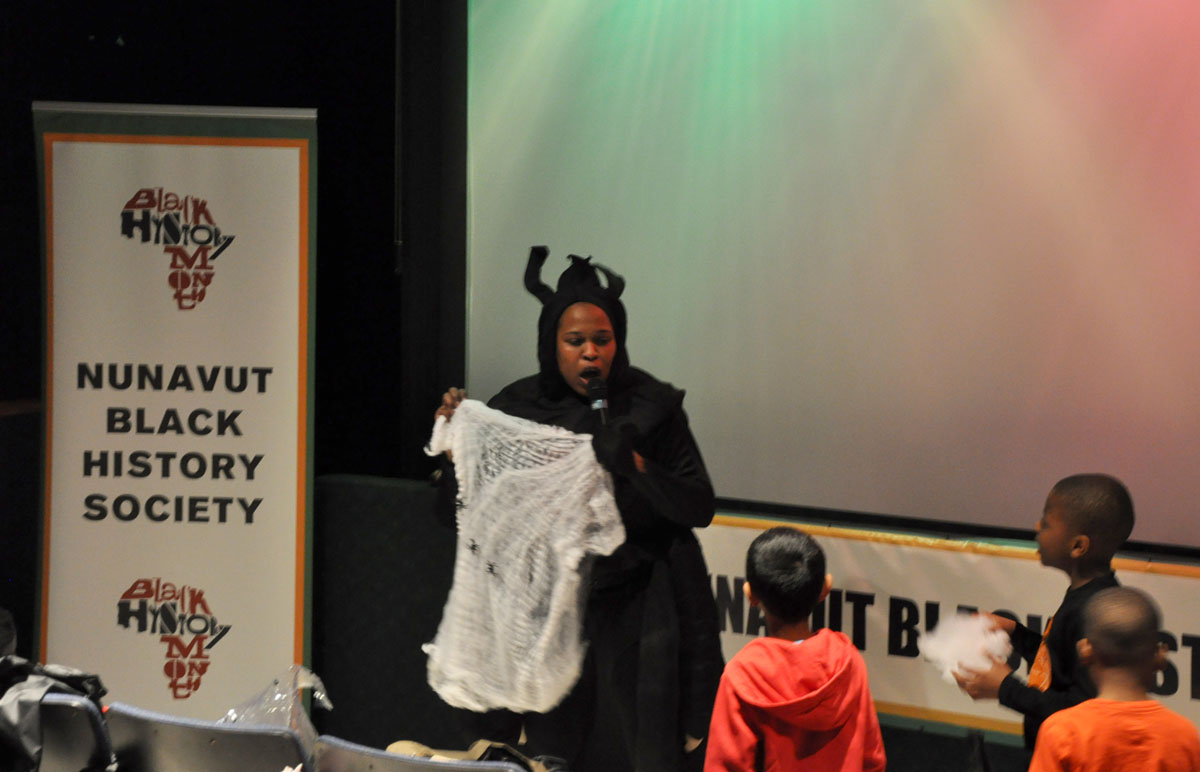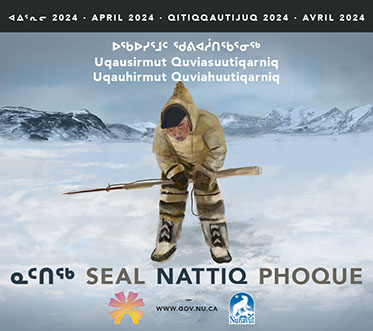Nunavut’s Black History society shows link between African, Inuit storytelling
“An event like this helps with cultural understanding”
Stephanie Bernard of the Nunavut Black History Society plays Anansi, a character in west African folklore, at a storytelling event held at the Astro Theatre on Sunday, Feb. 24. (Photo by Sarah Rogers)
A human-sized spider emerges from the back of a darkened theatre, cackling and holding a web and baby spider.
This is Anansi, one of the best-known characters in West African and Caribbean folklore, considered to be the spirit of all knowledge sharing.
“I am the king of all stories,” says Anansi, played by Stephanie Bernard, as she invites the children in the crowd to stretch out her spider web across the front of the theatre.
Bernard is the vice-president of the Nunavut Black History Society, which is hosting a series of events in Iqaluit throughout February, during Black History Month.
The Feb. 24 event at the Astro Theatre is called Black History Through Storytelling, and the crowd hears both African and Inuit legends, read or portrayed through short films.
“Storytelling and the oral tradition are important to both our culture and Inuit culture,” Bernard said.
“Even from ancient days, Africans and their descendants have been passing on stories to teach children and to inspire them.”
As with Inuit legends, many stories are told to children to keep them safe, or frighten them away from bad behaviour.
Bernard’s first exposure to Inuit oral storytelling was when the Franklin ships were discovered near Gjoa Haven with the help of Inuit knowledge passed down through generations.
Black History Month coincides with Uqausirmut Quviasuutiqarniq, Nunavut’s annual celebration of Inuktut, so the society wanted to showcase both African and Inuit tradition.
“An event like this helps with cultural understanding,” Bernard said.
There are an estimated 250-300 Iqaluit residents of African descent and another 300 living elsewhere in the territory, and that number continues to grow.
“When I came here six years ago, I knew every single other black person in Iqaluit,” Bernard laughed. “Now, I don’t.”
During the last week of February, the society is hosting an exhibition on Black history called On The Road Again, which can be viewed at the cadet hall from Feb. 25 to March 2 from 10 a.m. to 6 p.m.
Next Sunday, March 3, Iqalungmiut are invited to a Black History Month finale celebration at Inuksuk High School. The event, called the Masquerade Meets the Drum, is free and runs from 2 p.m. to 5 p.m.
There are more details available on the society’s Facebook page.






Unlike every other place on the planet, it seems a group of people cannot celebrate their own event without feeling the obligation of involving the locals just in case it hurts their self-esteem. If the subject is Africans, why are Inuit dragged into the subject. The unrequired attempts of every group to somehow justify their own celebration by explaining how similar they are to Inuit is rather pathetic, and honestly I am not sure if Inuit really fall for it. Blacks know that on the daily discrimination they face from locals. I see this one other fabricated concepts that are painted by Inuit paint to look local although deep inside it is not, e.g. Inuit Qaujimajatuqangit, which have nothing to do with Inuit Societal Values. Their existence is based on the assumption Inuit have societal values in first place, which is a concept that fits in the southern societies. Celebrate African month and do not feel guilty about it, it is your right, but trying to somehow make up connections between African and Inuit cultures is a massive insult to your audience. What next, Chinese New Year should highlight how the Chinese dragon is similar to Qiqirn?
This comment has more to do with you that it has anything to do with Inuit or Black people. There is actually a lot of similarity between African/black cultures/tradition and Inuit culture/traditions as there are many similarities between all Indigenous cultures. It is not a fabricated connection as you say and it is absurd to say just because it is Black History Month, we can not celebrate our connection to fellow Indigenous peoples from all over the world.
For example, African beading, particularly South African Zulu Beading, is almost identical to Inuit beading. African preparation of hides (animals skins) for clothing, mats, blankets is very similar to Inuit methods. Different animals of course but this is shared.
The way Inuit use the entire animal and the value placed on not wasting the animal or killing in vein is very similar to may African traditions.
Custom adoptions is another one. Though African countries do not have legislation in place as has been done in Canada, custom adoption was and still is very common in many African countries. Grandparents are often the ones who will take and raise their children’s kids for a variety of reasons and its very common and accepted. Siblings and cousins will often do the same.
The extended family and some of the naming practices are also very similar.
I could go into more detail, but It seems critical self-reflection and a little bit of research on your part would go a long way. Seems like this event could have been a great learning opportunity for you.
All the best.
Yes, pre-industrial (or even pre-agricultural) people around the world have some similar practices, traditions and technology.
But hey, aren’t the Zulu relatively recent arrivals in southern Africa – not as recent as Europeans of course, but Zulu residence in the region is not nearly as long as the (Indigeous) San.
I’ve noticed Inuit have an affinity for Saami and Mongolians…. maybe they’re just not that into you? I wouldn’t take offence or try to push the issue.
The Bantu (of which Zulu are a part of) arrived in Southern Africa (from the Congo Basin) much later than the San and the Khoikhoi – now referred to as the khoisan. I’m not sure there are, or were any San in what is now South Africa specifically, but you could be right. However; this was not the point of the response. The point was that Africans/Blacks do indeed share similarities with Inuit and other Indigenous peoples around the world, contrary to Siobhan’s original comment, which i believe was uncalled for.
I have also noticed the affinity between Inuit and Saami and Mongolians, but I have never actually looked into it so thanks for reminding me to look further into it.
That’s such a weird way of looking at a group of people sharing their culture and connecting with other people. I don’t think this story telling event was planned because the organizers felt ‘guilty’ to celebrate the range of cultures in the African diapora. I think part of the Canadian experience is sharing your way of looking at the world with your neighbour. I was lucky to grow up and go to schools with people from a ton of different backgrounds and I appreciate that they were open with their culture and shared it with me. It’s impossible for hate to grow when we learn we are all human and we have more that brings us together than sets us apart. We need more people to do this and we should be encouraging more positive cross-cultural activities in Nunavut.
to ‘Huh?’..First of all this is Canada and we have freedom of speech, so when someone shares an opinion, it is not ‘uncalled for’ because it doesn’t please you! Second, indigenous simply means originating in a particular place. Technically, every human is indigenous of some type, unless they came from another planet! What you are referring to are more basic activities people practice than a ‘culture’. With civilization, such practices eventually develop and change, and that happened with every modern day lifestyle. I am not saying this is good or bad, to each his own, but my critique is more on how you are trying to associate yourself with Inuit with a cheap attempt that everyone can see through. How does beading mean you have anything common with Inuit. African history and Inuit history have zero in common because they are based on different circumstances, and different opposite parts of the world. Otherwise, African tribes sleep during the night like Inuit, wow such a lot of common aspects, maybe Inuit are African after all!
Inuit are African, actually. We all are as we evolved there.
That said, I don’t see why you are so upset with those who have pointed out the cultural similarities between Inuit and Africans. This is the most interesting question to me in this discussion, why are you going off on this? What is motivating you? Think about it. You might want to diminish those connections and similarities because, well, I don’t know, somehow it makes you feel less secure, maybe?
Either way, it’s really pointless.
Sioban please scroll to page 18 on the link below and that should help address your concern
https://books.google.ca/books?id=rVoNxuS4n1gC&lpg=PA18&dq=ubuntu%20nunavut&pg=PA20#v=onepage&q=ubuntu%20nunavut&f=false